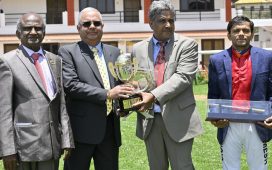After a five-hour marathon hearing, there is no decision yet on the question of whether Justify may be disqualified from his win in the 2018 Grade 1 Santa Anita Derby or whether Hoppertunity could be disqualified from his win in the G3 Tokyo City Cup on the following day. Stewards heard evidence from attorneys on a California Horse Racing Board (CHRB) complaint, which sought disqualification of the horses but no action against trainer Bob Baffert due to post-race tests for scopolamine.
“Once I get the transcript [from Thursday’s hearing], it will take me a little while to write a decision, whatever that decision will be,” said steward John Herbuveaux, who led the proceedings. “It’s not going to be something that will happen within the very near future.
“I would also like to state for the record that whatever decision this board comes to, it is appealable.”
The CHRB made the decision in a closed-doors executive session in summer 2018 not to pursue disciplinary action or disqualify horses after a cluster of positive tests for scopolamine across multiple barns, which CHRB staff determined was a result of exposure to jimsonweed in hay. The CHRB recently settled a civil suit with Bolt d’Oro owner Mick Ruis, whose horse finished behind Justify in the Santa Anita Derby, and agreed to file a complaint seeking disqualification as part of that settlement. Connections of Justify and Hoppertunity subsequently filed suit in Los Angeles Superior Court seeking a temporary restraining order to prevent the stewards from hearing the case. The application for that restraining order was denied.
According to testimony on Thursday, CHRB investigators questioned barn staff and hay suppliers after getting positive scopolamine test results to learn more about how a scopolamine exposure may have occurred. CHRB equine medical director Dr. Rick Arthur said investigators took samples of plants from the area where hay was grown for the Santa Anita backstretch and discovered jimsonweed.
Arthur, who was called to testify by Bob Baffert attorney Craig Robertson, has not changed his position on the scopolamine finding, stating that he believes it was a clear case of contamination.
“You should really look at this as a horse poisoning,” Arthur said.
Arthur said he viewed the scopolamine case as similar to that of zilpaterol findings, which have been linked to feed contamination in most situations. The board did not pursue action in those cases because it was accepted that exposure to the substance was beyond the connections’ control. In total, Arthur said there were 15 other cases of horses testing positive for scopolamine at the time, of which five were over the screening limit.
Dr. Steven Barker, professor emeritus at the Louisiana State University’s School of Veterinary Medicine and longtime director of LSU’s Equine Medication Surveillance Laboratory, testified that scopolamine would have no impact on a horse’s performance in the levels found in Justify and Hoppertunity. Scopolamine has been used in a therapeutic capacity in humans for its impacts on smooth muscle, soothing motion sickness and nausea, and was used for a time in horses to combat gas colic. It has since been replaced with buscopan, which unlike scopolamine, doesn’t cross the blood-brain barrier and impact behavior.
“It’s more likely to have a detrimental effect on a horse who was positive,” Barker said of scopolamine’s impact on performance, noting that it has been found to have a sedation-like effect when used therapeutically.
For the amount of scopolamine detected in Justify and Hoppertunity, Barker said they would have needed to eat roughly 11 grams and 6 grams of jimsonweed respectively — which he thought was very possible, given that the baling process may unevenly distribute small amounts of any given weed across different bales or flakes.
Robert Patterson, counsel for the CHRB, seemed uninterested in whether the substance had an impact on Justify’s performance and focused instead on the letter of California regulation at the time of his race in 2018. Patterson asserted that California regulations designated scopolamine as a Class 3 substance then, and those regulations stated that horses completing races in the state with positive tests for Class 1, 2, or 3 substances afterwards shall be disqualified. Scopolamine was made a Class 4 substance at the start of 2019 in California.
Robertson disagreed that the substance’s Class 3 status was binding. California regulation is designed to keep pace with the classification system put out by the Association of Racing Commissioners International (ARCI), which changed its classification of scopolamine much earlier than January 2019. California law prohibits a state agency from incorporating a rule by reference, meaning each time ARCI changes its guidelines, the CHRB has to draft and pass rule changes anew. Robertson said ARCI had the substance as a Class 4 at the time of Justify’s start in the Santa Anita Derby, but the CHRB hadn’t updated its regulations yet. Robertson believes that because the intent of California’s rule is to mirror suggestions of ARCI, Baffert and the other connections shouldn’t be punished for the Board failing to keep its regulations current.
Beyond that, attorneys for Justify’s connections expressed frustration at the potential impacts of a disqualification so long after the race.
Amanda Groves, representing WinStar Farm, China Horse Club, Head of Plains Partners, Starlight Racing, and Mike Smith, said that the proceedings are “creating a cloud of uncertainty, the dreaded asterisk that goes next to some athletes’ names.”
“It has had a negative effect on Justify’s reputation and standing in the community of horse owners,” she said.
Further, Robertson questioned how a decision to disqualify the horse now could open a Pandora’s Box for other Board decisions that could be finalized and reconsidered — and for the sport’s reputation.
“We’re going to kill the sport if we don’t stop cases like this going forward,” said Robertson. “Every time we use the words ‘drug positive’ or ‘disqualification’ there are certain members of the press who are not fans f the sport and want to see it go away, they latch onto those words and flash it out there … the general public reads it and thinks a horse is being drugged, and that’s not true.
“I urge the Board not to give them that headline.”
New to the Paulick Report? Click here to sign up for our daily email newsletter to keep up on this and other stories happening in the Thoroughbred industry.
Copyright © 2020 Paulick Report.







